Ccrn cardiac review - Study guides, Class notes & Summaries
Looking for the best study guides, study notes and summaries about Ccrn cardiac review? On this page you'll find 93 study documents about Ccrn cardiac review.
All 93 results
Sort by
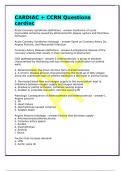
-
Exam (elaborations) CARDIAC + CCRN Questions cardiac 2 Exam (elaborations) Cardiovascular -- Barron s CCRN 3 Exam (elaborations) CCRN Cardiac Review 4 Exam (elaborations) CCRN Cardiovascular 5 Exam (elaborations) CCRN Review: Cardiovascular Review 6
- Package deal • 6 items • 2024
-
- $24.27
- + learn more
Exam (elaborations) CARDIAC + CCRN Questions cardiac 2 Exam (elaborations) Cardiovascular -- Barron s CCRN 3 Exam (elaborations) CCRN Cardiac Review 4 Exam (elaborations) CCRN Cardiovascular 5 Exam (elaborations) CCRN Review: Cardiovascular Review 6 Exam (elaborations) CCRN: Cardiac
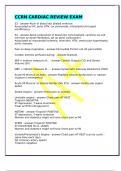
-
CCRN Cardiac Review
- Exam (elaborations) • 7 pages • 2024
-
Available in package deal
-
- $9.99
- + learn more
S3 - answer-Rush of blood into dilated ventricle Associated w/ HF, pulm HTN, cor pulmonale, mitral/aortic/tricuspid insufficiency S4 - answer-Atrial contraction of blood into noncompliant ventricle (so will not hear w/ Atrial Fibrillation, d/t no atrial contraction) Associated w/ myocardial ischemia, infarction, HTN, ventricular hypertrophy, aortic stenosis Pain on deep inspiration - answer-Pericardial friction rub d/t pericarditis Cardiac arteries perfused during: - answer-Diastole ...
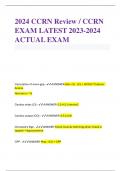
-
2024 CCRN Review / CCRN EXAM LATEST 2023-2024 ACTUAL EXAM
- Exam (elaborations) • 13 pages • 2024
-
- $17.99
- + learn more
2024 CCRN Review / CCRN EXAM LATEST ACTUAL EXAM Calculation of anion gap - ANSWER-(Na + K) - (CL + HCO3) *Cations - Anions Normal is < 15 Cardiac index (CI) - ANSWER-2.5-4.5 L/min/m2 Cardiac output (CO) - ANSWER-4-5 L/min Chvostek's Sign - ANSWER-Facial muscle twitching when cheek is tapped - Hypocalcemia CPP - ANSWER-Map - ICU = CPP
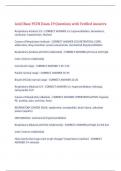
-
ALL PCCN Exam (22 Sets) Questions with Verified Answers,100% CORRECT
- Package deal • 22 items • 2024
-
- $30.49
- + learn more
PCCN Exam 120 Questions with Verified Answers,PCCN practice exam notes (2021) 53 Questions with Verified Answers,PCCN Exam 200 Questions with Verified Answers,Adult CCRN/PCCN Certification practice Test 50 Questions with Verified Answers,PCCN Exam 132 Questions with Verified Answers,PCCN Review Cardiac Exam Questions with Verified Answers,
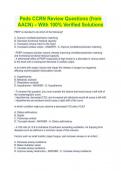
-
Peds CCRN Review Questions (from AACN) – With 100% Verified Solutions
- Exam (elaborations) • 35 pages • 2024
-
Available in package deal
-
- $16.00
- + learn more
Peds CCRN Review Questions (from AACN) – With 100% Verified Solutions Peds CCRN Review Questions (from AACN) – With 100% Verified Solutions PEEP is intended to do which of the following? A. Improve ventilation/perfusion matching B. Decrease functional residual capacity C. Increased venous return to the heart D. Increased cardiac output - ANSWER - A. Improve ventilation/perfusion matching - PEEP increases alveolar volume, thereby improving ventilation/perfusion matching and incre...
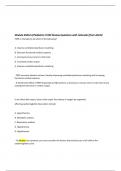
-
Module EXAM 2/Pediatrics CCRN Review Questions with rationale (from AACN)
- Exam (elaborations) • 56 pages • 2023
-
Available in package deal
-
- $10.00
- + learn more
Module EXAM 2/Pediatrics CCRN Review Questions with rationale (from AACN) PEEP is intended to do which of the following? A. Improve ventilation/perfusion matching B. Decrease functional residual capacity C. Increased venous return to the heart D. Increased cardiac output A. Improve ventilation/perfusion matching - PEEP increases alveolar volume, thereby improving ventilation/perfusion matching and increasing functional residual capacity. - A detrimental effect of PEEP (especially at high...
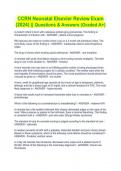
-
CCRN Neonatal Elsevier Review Exam (2024) || Questions & Answers (Graded A+)
- Exam (elaborations) • 13 pages • 2024
-
Available in package deal
-
- $11.00
- + learn more
CCRN Neonatal Elsevier Review Exam (2024) || Questions & Answers (Graded A+) CCRN Neonatal Elsevier Review Exam (2024) || Questions & Answers (Graded A+) A preterm infant is born with cutaneous pinkish-gray granulomas. This finding is characterstic of infection with - ANSWER - listeria monocytogenes Rib fractures are noted on routine chest x-ray on a 3 month old premature infant. The most likely cause of this finding is - ANSWER - inadequate calcium and phosphorus intake The drug of ch...
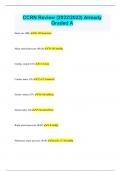
-
CCRN Review (2022/2023) Already Graded A
- Exam (elaborations) • 17 pages • 2023
- Available in package deal
-
- $9.99
- + learn more
CCRN Review (2022/2023) Already Graded A Heart rate (HR) 60-100 beats/min Mean arterial pressure (MAP) 70-105 mmHg Cardiac output (CO) 4-5 L/min Cardiac index (CI) 2.5-4.5 L/min/m2 Stroke volume (SV) 50-100 ml/beat Stroke index (SI) 35-60 ml/m2/beat Right arterial pressure (RAP) 4-8 mmHg Pulmonary artery pressure (PAP) Systolic 15-30 mmHg Diastolic 5-15 mmHg Pulmonary artery occlusive pressure (PAOP) 8-12 mmHg Systemic vascular resistance (SVR) 800-1200 dynes/sec/cm-5 Systemic vascula...
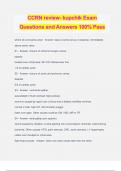
-
CCRN review- kupchik Exam Questions and Answers 100% Pass
- Exam (elaborations) • 15 pages • 2024
- Available in package deal
-
- $12.49
- + learn more
CCRN review- kupchik Exam Questions and Answers 100% Pass where do coronaries arise - Answer- base of aorta (sinus of valsalva); immediately above aortic valve S1 - Answer- closure of mitral & tricuspic valves systole loudest over mitral area, 5th ICS midclavicular line 1/3 of cardiac cycle S2 - Answer- closure of aortic and pulmonic valves diastole 2/3 of cardiac cycle S3 - Answer- ventricular gallop auscultated in fluid overload; high preload. sound is caused by rapid rush of bloo...
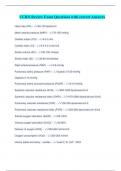
-
CCRN Review Exam Questions with correct Answers
- Exam (elaborations) • 10 pages • 2023
- Available in package deal
-
- $11.49
- + learn more
CCRN Review Exam Questions with correct Answers Heart rate (HR) - 60-100 beats/min Mean arterial pressure (MAP) - 70-105 mmHg Cardiac output (CO) - 4-5 L/min Cardiac index (CI) - 2.5-4.5 L/min/m2 Stroke volume (SV) - 50-100 ml/beat Stroke index (SI) - 35-60 ml/m2/beat Right arterial pressure (RAP) - 4-8 mmHg Pulmonary artery pressure (PAP) - Systolic 15-30 mmHg Diastolic 5-15 mmHg Pulmonary artery occlusive pressure (PAOP) - 8-12 mmHg Systemic vascular resistance (SVR) - 800-1200 dyne...

Did you know that on average a seller on Stuvia earns $82 per month selling study resources? Hmm, hint, hint. Discover all about earning on Stuvia


